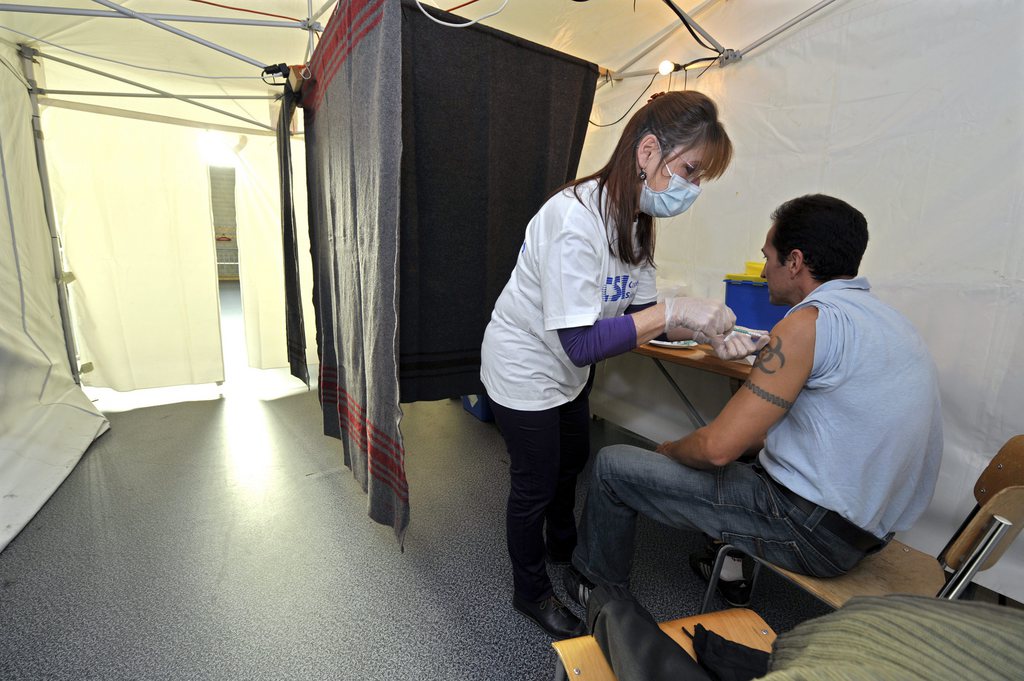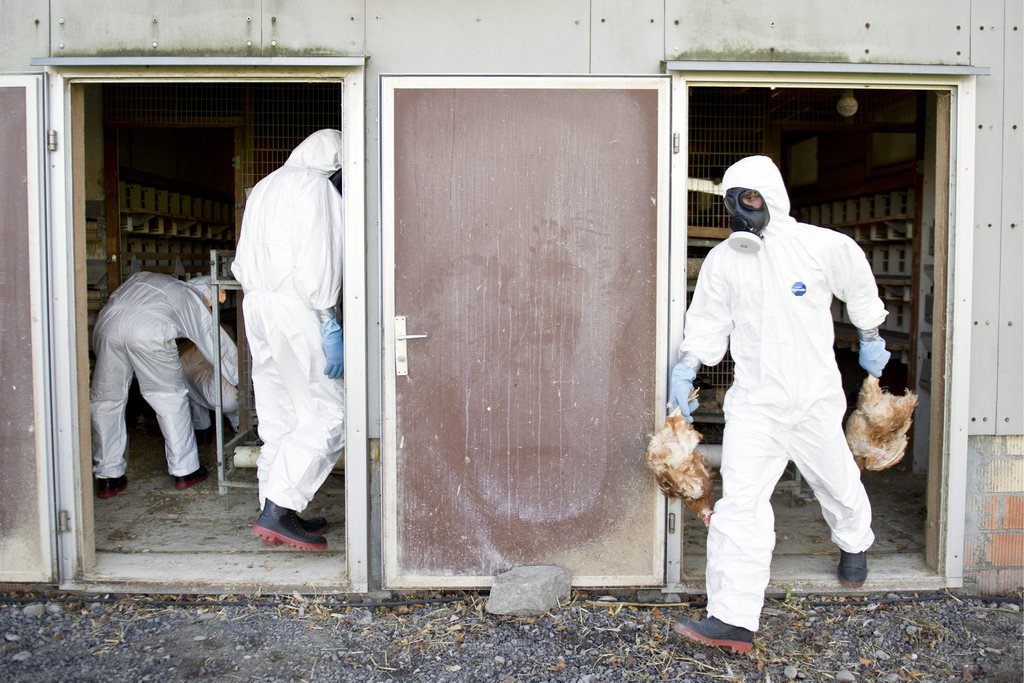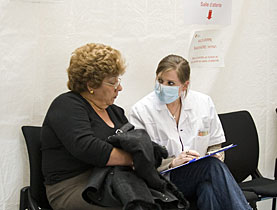Vote shows fear of epidemics and central power

Nationwide vaccination campaigns traditionally cause a lot of mistrust among Swiss citizens. An amended law, giving the federal authorities increased powers to impose mandatory jabs, is being challenged at the ballot box in September.
When a comfortable majority in both chambers of parliament approved the reform last year, a mixed group of opponents, led by a holistic therapist Daniel Trappitsch, was waiting to mount a new challenge.
He and his conservative allies easily collected the necessary signatures to force a nationwide vote.
Handing the cardboard boxes with the list of citizens names over to the Federal Chancellery in January, Lukas Reimann from the rightwing Swiss People’s Party told reporters: “Everybody should be responsible for his or her own body.”
Opposition to state intervention had already prompted the group to try to bring down a law on animal epidemics last year, but it failed at the ballot box.
Resistance against a central authority with powers to call for mandatory vaccination appears to be engrained in the Swiss political mindset.
A ballot on a first epidemics law back in 1882 set a precedent. For more than a century, it has been up to the country’s 26 cantons to organise and carry out inoculation campaigns.
No one can be forced to get vaccinated against his or her will either under the current or the new law.
Under the new law there are no fines or prison sentences for people who refuse to get the jabs declared mandatory by the authorities.
Citizens in canton Geneva who refuse to get inoculated against the contagious pulmonary disease, diphtheria, currently risk being fined.
Declaring a vaccination compulsory amounts to a strong “recommendation” and refusal to abide by the rules “can have consequences”, according to the Federal Health Office.
Hospitals can order their staff to be inoculated against contagious diseases to protect the patients. Failure to do so can result in a temporary ban from working in certain wards.
Global mobility
But six years ago, the cantonal health authorities – faced with a growing risk of pandemics as a result of global mobility, climate change and the spread of contagious diseases – launched a reform of the epidemics law.
In 2010, a government-sponsored bill was presented to parliament, which passed it with an overwhelming majority two years later.
The new law clarifies the tasks between the various institutional levels. The government primarily controls and coordinates as a strategic body, while the cantons remain in charge of implementing necessary measures. An additional panel is created to improve cooperation.
Largely uncontested elements of the reform are research programmes on pathogens and infections in hospitals as well as public information campaigns.
Special and extraordinary
Opposition against the new law is as diverse as the conservative and rightwing groups behind it. Even some leftwing politicians have reservations about the legal amendment.
What unites them all is their unwillingness to grant the federal authorities the right to order compulsory vaccination campaigns, overruling cantonal sovereignty.
“It is inappropriate to boost the powers of the government,” says Yvonne Gilli, parliamentarian for the centre-left Green Party.
Gilli, a practising medical doctor, believes there is no need to adapt current law for reasons of public health. She agrees, however, to give the government a greater say, but in “extraordinary situations only”.
The law foresees that the government, following consultations with the cantons, can get involved in what is described as “special situations”. It primarily affects certain groups of people, notably professionals in the health sector.
A “special situation” is defined by the Federal Health Office as the crisis about the SARS viral respiratory disease ten years ago, which had a global dimension but a very limited impact on Switzerland.
“Extraordinary situations” on the other hand pose an immediate threat to the country.

More
Swine flu vaccine: small patients get it first
Pressure
Gilli, who sits in a parliamentary health committee, says with the amended law comes a higher risk of pressure “to put economic criteria above epidemiological considerations”.
Interests of the business world in vaccination programmes must not be overlooked, since millions of doses of vaccine are at stake, she argues.
However, Gilli rejects allegations of a conspiracy between the pharmaceutical industry and the World Health Organization and she dissociates herself from fundamental anti-vaccination campaigners.
In contrast, her medical colleague in parliament, Ignazio Cassis, supports the new epidemics law.
He downplays fears about undue influence-peddling by the pharmaceutical companies. Cassis, a member of the centre-right Radical Party, is convinced that “the risk is reduced to a minimum” amid “total transparency” in Switzerland.
Neither does Cassis agree with those opponents who criticise the law for undermining the federalist system, granting cantons wide-ranging autonomy.
For him, the new law simply specifies existing regulations and puts them into context.
At the moment cantons can call for mandatory vaccinations in a “normal” situation, while the government can become active in extraordinary circumstances. But this has never happened.
Three separate issues will be put to a nationwide vote:
Besides the referendum on an amended epidemics law, voters also have the final say on a decision by parliament to ease restrictions on night-time shopping at petrol stations.
At stake is also an initiative by a pacifist group calling for an end to mandatory conscription.
As a rule, votes take place four times a year at a nationwide level.
Votes and elections also take place in many of the country’s 26 cantons and at a local level.

In compliance with the JTI standards
More: SWI swissinfo.ch certified by the Journalism Trust Initiative





You can find an overview of ongoing debates with our journalists here. Please join us!
If you want to start a conversation about a topic raised in this article or want to report factual errors, email us at english@swissinfo.ch.